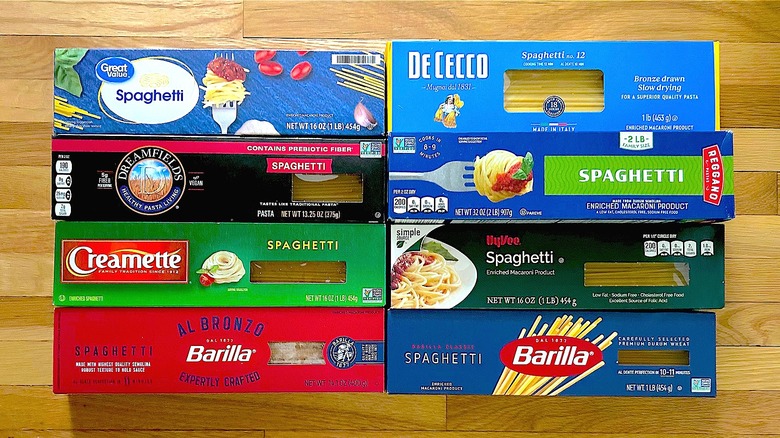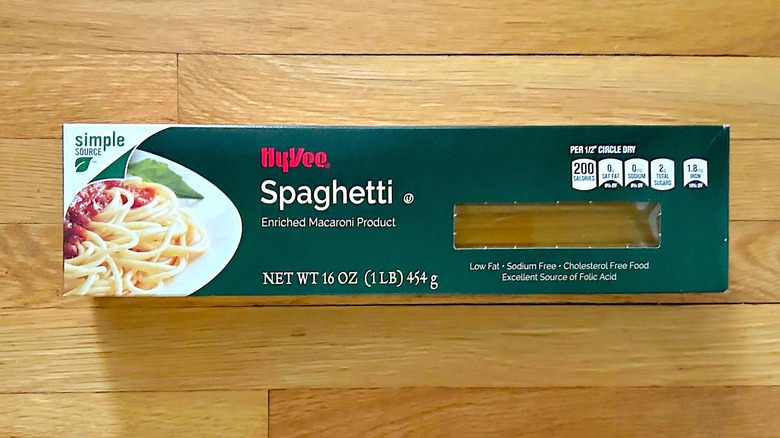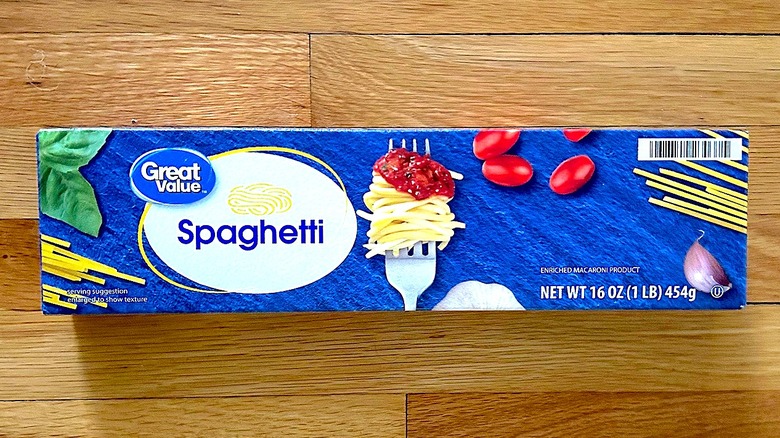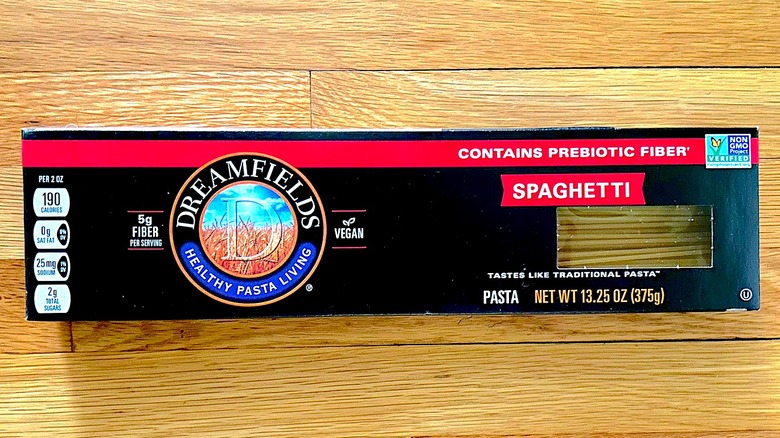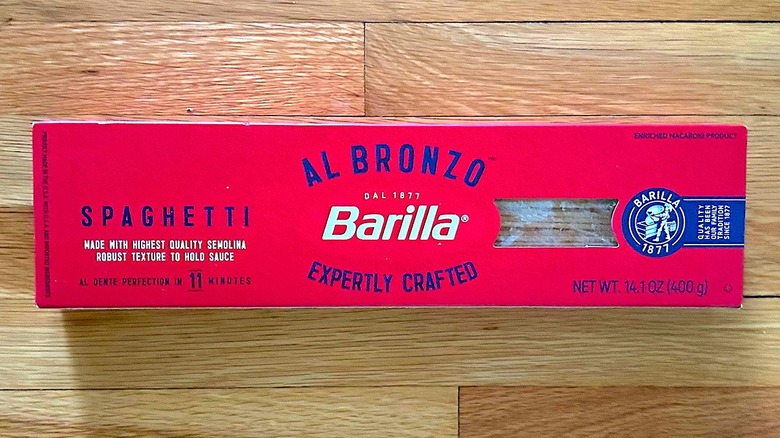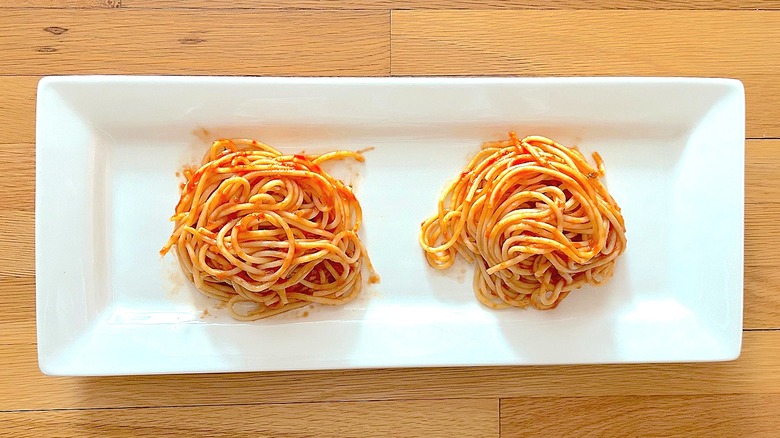The Ultimate Ranking Of Boxed Spaghetti Brands
We may receive a commission on purchases made from links.
Store-bought spaghetti is one of those staples that every home should have on hand. A simple, affordable, and quick meal can be whipped up in a flash when you have a box of these noodles lying around in the pantry. That said, there's more to cooking up the perfect spaghetti dinner than simply knowing when to combine the pasta with the sauce or making sure you hang onto that priceless pasta water. At its most basic, you need to start with a quality brand of spaghetti.
It may seem like combining semolina flour with water and extruding it into a spaghetti shape is something that shouldn't be that difficult to do, nor should the results between one brand and another be notably different. But while the variations are subtle, there are marked differences between one boxed spaghetti brand and another that you should keep in mind if you want the best quality results, predominantly in texture and flavor.
To find out which standard brand of boxed spaghetti reigns supreme, I collected a healthy cross-section of these noodles to cook up and consume. After recovering from my carbohydrate-induced coma, I ranked them based on aroma, texture, flavor, and overall quality. Read on to discover the best boxed spaghetti brand to stock up on the next time you visit your favorite local grocery store.
8. Hy-Vee
Hy-Vee's store brand spaghetti was a decent bet when it came to cost but unfortunately, in terms of overall quality, it trailed behind all the others. Ranking dead last, this pasta wasn't bad, but it also wasn't anything notable. Its aroma was distinctly that of semolina flour, which was a good thing. Unfortunately, this scent didn't carry over to the flavor, which had an odd cardboard-like, artificial taste. There was zero complexity to the noodle and, without sauce, it wasn't anything worth writing home about.
The noodles themselves were slightly fatter than the others when cooked, which may seem odd considering that they all look relatively identical in the box. This spaghetti had a relatively characteristic al dente texture, that was not overly chewy or soggy, when cooked according to the packaging directions. While this spaghetti would be fine used in a highly-flavored sauce, like a recipe for pasta alla carbonara, it's at the lower end of average, getting a grade of C-.
7. Great Value
Second to last was another store-brand offering. While Great Value is cost-effective, you get what you pay for. This pasta was as average as it gets, but a step above the Hy-Vee brand, notably in the taste department. The aroma of this spaghetti was very mild, with a floury nose, like that of an undercooked roux with the flour not fully toasted. Its texture was notably al dente, perhaps slightly more so than the Hy-Vee, which I prefer, though this is subjective and may depend on exactly how the pasta was cooked.
In terms of flavor, although the semolina flour was not evident in the scent of this pasta, it was more evident in the taste. With that, the flavor was still rather bland, lacking in any complexity and having a slightly cardboard-like aftertaste that wasn't distracting, but also made it less palatable than some of the more superior brands I sampled. Overall, this brand earned a C grade.
6. De Cecco
If I'm honest, I am surprised that De Cecco's spaghetti did not rank higher than it did. Its pasta, especially the penne, typically performs well when compared with other brands. That said, in this ranking, I was underwhelmed with its spaghetti. Again, while it was serviceable, it didn't blow me away. It lacked some of the complexity that I appreciated in the highest ranking brands, particularly in its flavor.
The aroma of this pasta was relatively lacking, with perhaps just a hint of semolina flour bursting through. The texture was the ideal al dente, which I always appreciate. The flavor, though nutty, was relatively mild, without any nuance or interest. I did enjoy the bright golden hue of the cooked noodles. It retained a color that was more attractive than many of the other spaghetti varieties. This is especially important when you are repurposing cold spaghetti for a summery pasta salad, for which this brand would be well-suited. Overall, I gave this spaghetti a C+ grade.
5. Dreamfields
One of the first brands with a distinctive flavor and aroma was the spaghetti from Dreamfields. While I didn't love this pasta, I appreciated the fact that there was some complexity to it, though that everyone's tastes are different. This brand specializes in producing a pasta that's slightly higher in overall fiber. This fiber is delivered in the form of an added prebiotic, known as inulin. According to the Cleveland Clinic, this type of fiber, which is naturally occurring in many plants, can promote a healthy gut and may increase satiety. However, some may also experience gastrointestinal issues ranging from bloating to diarrhea.
Potential health benefits aside, the aroma of this spaghetti was notably grassy. It had a color that was quite pale compared with the other spaghetti varieties, and a texture that was on the softer side. If you like your spaghetti al dente, this is not the noodle for you, which is one of the reasons I did not rank it higher. The flavor of this spaghetti was assertively earthy and robust, rather than nutty. This may appeal to some, and could work under some circumstances, like in a hearty spaghetti casserole recipe, where the texture of the noodles will be less noticeable after the dish is baked, and there are plenty of other ingredients to offset that slightly bitter aftertaste. Overall, this pasta earned a B- grade.
4. Creamette
Creamette may not be the fanciest brand or have the most elaborate packaging, but what it does have is consistency. The company has existed since the late 1800s, and in the 1950s it became well-known for featuring a unique recipe on every box of pasta. There's a kind of nostalgia that comes with eating spaghetti from Creamette, and it satisfies every time, even if it isn't the most exciting of the spaghetti varieties I sampled.
The aroma of this spaghetti was slightly nutty, but not particularly assertive. Its texture was the exact type of al dente I like — chewy, but not starchy. The flavor of this spaghetti is exactly what you want in a noodle. It's natural, wholesome, and has a mild semolina aftertaste that's pleasantly toasty, but not especially complex. Overall, this spaghetti garnered an A- grade, and it would be ideal for a super simple instant pot spaghetti meal on a busy weeknight.
3. Barilla
There's a reason Barilla consistently gets high marks for its pasta. It's a brand that has continued to evolve, expanding its offerings while maintaining the integrity of its ingredients and production methods. In this case, the regular Barilla pasta broke into the top three of this ranking, but was edged out by a competitor, and by itself, with a premium line of bronze die-cut pastas. More on that in a bit.
The first thing you notice about Barilla pasta is its dark yellow color and its deep, nutty aroma. The second thing you will notice is that these noodles are a bit thinner than the top two, though this does not impact the texture, which is a perfect al dente with an extra element of chewiness that's very pleasant. Barilla is made from two types of flour, semolina and durum wheat flour. While both are derived from high gluten, hard durum wheat, the former is more coarsely ground, while the latter has a finer consistency. This provides a complex texture and flavor that's evident in this spaghetti.
The primary reason this pasta didn't rank higher was that the top two had just a bit more nuanced flavor, though this is still a premium brand that I highly recommend. For overall quality, taste, and texture, Barilla scores a solid A grade.
2. Reggano
In second place on this ranking of spaghetti brands is the Reggano variety available from Aldi. It's no secret that Aldi enjoys an almost cult-like following. Its smaller store size, limited seasonal offering of products, and general business model bring high-quality to consumers with serious savings. Among the staples to stock up on when you make your weekly trek to Aldi is this pasta, which scored high in every category.
This pasta had an intense, nutty and earthy aroma that was quite complex. Similar to the classic Barilla, the noodles were relatively thin once cooked, compared with other brands. The texture of this spaghetti was perfectly al dente, though perhaps not quite as chewy as the Barilla pasta.
Flavor was where this pasta really shone. It had a very natural, earthy, robust flavor, punctuated by the toasty elements characteristic of semolina flour. This is a pasta that would easily shine on its own without a lot of fussy ingredients, such as in a spin on a cacio e pepe dish. This pasta also scored a solid A grade, only slightly edging out the Barilla Classic because of its distinctive flavor.
1. Al Bronzo Barilla
Ranking on top of this list of boxed spaghetti brands is Barilla's Al Bronzo line. At first glance, the ingredients for this pasta appear to be identical to the classic Barilla offering. Where this pasta differs is in its production method. These noodles are crafted using micro-engraved bronze dies that confer a uniquely muscular texture capable of clinging to sauce more readily.
I was curious to see if this production method was all hype or if there was anything to it, so I thought it was worth comparing the two Barilla's. The short answer was yes. This pasta was dynamite. The semolina and durum wheat flour used had an intensely robust aroma and the spaghetti had a rich, dark color that was almost tan in hue, rather than a shade of yellow.
The texture was where this pasta really hit it out of the ballpark. It was toothsome and the noodles heartier than the classic Barilla ones. And while there was not much of a difference from one brand to another in terms of how well the spaghetti held the sauce, this one did appear to be more evenly coated. The taste, in keeping with the aroma, was earthy, complex, and intensely flavorful. This pasta earned an enthusiastic A+ grade and I'd recommend it wholeheartedly.
Methodology
When determining which brands of spaghetti to include in this ranking, I discovered that there were a lot of options out there that I could have purchased. Many brands produce a regular and whole wheat iteration. Some, like Barilla, also have high-protein, gluten-free, and keto options. While I did opt to include both the regular and Al Bronzo iterations of Barilla pasta, I did so because they are essentially the same ingredients, with the primary difference being the type of pasta extruder used. I thought it was valuable to compare these side-by-side. Otherwise, I did not include any whole wheat, gluten-free or other varieties of pasta, as their basic ingredients differed markedly from one another, making a fair comparison impossible.
I cooked each spaghetti according to the directions on the box to ensure that I was preparing them according to the manufacturer's recommendations. I sampled the spaghetti plain and with sauce, both hot and at room temperature. While I was not basing my ranking expressly on how the sauce adhered to the pasta, I did want to get a sense of how similar these spaghetti brands were in terms of clinging to a standard tomato-based sauce. They all performed relatively equally. I also did not include any nutritional information, as these brands are all relatively similar in terms of calories, fat, sodium, sugars, and protein content. It is my hope that this ranking will help you to make the best buying and eating choices for you and your family.
